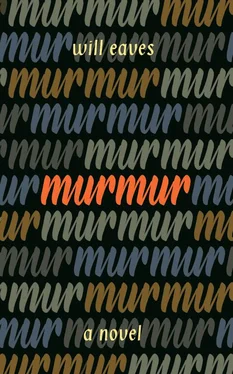“ x is a ray—a photo and a ghost. x is for hybrid vigor in a dog. x is a crossroads and a meeting point. x is anonymous. x is a parting kiss. x is against your name. x is your source, a secret, and expendable. x is a letter. x is not—”
Molyneaux hesitates. Uncurls his fists and holds his thighs.
“—the right answer?”
Stallbrook consults his documents and shakes his head. “Alas, invariably,” he says. “It is the main problem. You’re very convincing. I just can’t tell if what you say is what you mean, or if it makes a real difference to you, or not.”
The slightly fustian schoolboy inspects his hands. “I have a picture in my head of possible answers, but it is torn and wet at the edges. I think I died. I think I went into the underworld, where memories are affine spaces in a mirrored field and mackerel skies are filled with mackerel. I wanted to save someone from a disaster.”
The pressure of the water shears the room. Its prisoners noting the angle of their walls prepare for death, which does not come.
Across the plane of the ceiling, the tree of life takes root.
*
Molyneaux dives into my element.
The Colonel’s room dismembering itself supplies the waves with all manner of tidal junk. Books lollop past, their pages fronds, the groaning carcasses of shelves and desks and oak crossbeams go down into the trench.
The young man’s breathing apparatus is a length of garden hose. He has the idea that he will find Alec, set him to rights, avert this so-called disaster, and show him interesting specimens from the lake bed: freshwater mollusks, older marine fossils, Roman pottery and glass. He’s so happy. One of the ottomans, caught in the downdraught of the universal wreck, tugs at his curiosity. He follows it through the stone ruins of the main building. It’s larger than before, almost a habitable size.
Down, down it goes—and comes to rest in a small cloud of sediment. It finds its place not in the submerged grounds of Wargrave School but in a bustling market town, where people walk and breathe and drive their cars and go shopping. The flood is limitless, and in that flood, however far you have to go to find it, you will find the world remade an infinite number of times. Not everything has come to grief! For there are Royal Blue coaches in Sunkenbridge, with people from the former settlement of Earth mouthing behind their sealed windows.
He’s followed by some men and by a pike or two.
He thinks about his air supply. The other men—the men following, now catching up—can breathe the water very naturally, and one of them, his doctor, Mr. Julius Trentham, says that’s because he hasn’t any senses, so of course it’s fine.
But Molyneaux is still attached. He walks about the town as if it were a toy-world in a womb and he the line-fed embryo. As a small boy, he used to siphon water from the upstairs bath to gladden the garden: the hose smelled rubbery. He sucked hard to create the flow, could taste its warm, soapy approach. That sense persists and merges with a natural fear of lake water filling the pipe and drowning him.
The ottoman is barnacled with decorations like the Porters’ Lodge at King’s. It sits inside a sedimentary façade. Its gates are closed today—“ and they are closed to everyone without the key, which is disguised ,” Trentham whispers.
“What is the key’s disguise?” Molyneaux asks, his hand about to knock.
“The key is part of a message, carried unconsciously, like someone incubating a disease. It’s so well hidden we have not been able to find it—although we’ve tried for many years—because the search is self-inverse: we see only another search, looking for us. It is a fact about the world, and it is also personal.”
“Is it a word, this key?”
Trentham declines to speculate. He simply says, “Take a deep breath,” and Molyneaux obeys. He holds it, trusting to his doctor’s instructions.
“ You were the disaster ,” one of the other men puts in. “ You are the key. You were the disaster. You are the key …” (He is a circular machine, fishy and shy, not proud of his reduced function but sadly stuck with it.)
The hose sinks to the cobbled ground and never reaches it. Touched by a messenger of light, it feels the faint voltage and starts. An eel chicanes away. Molyneaux’s lungs collapse. His breath expends itself against the wood.
Now that he comes to look at them, for the first time, the gatehouse doors are skewed, bent out of shape at depth to form a new style—pseudo-Perpendicular Gothic. Out of the corner of his fading eye he sees the chapel tilt, its lines making a knight’s move to the left. The door leans over—buckles—with the weight of many atmospheres until the lock gives silently. A moment, then: the boy feeling not pain exactly but a more perfunctory loss. Some trophy slipping off a wall.
Molyneaux shrugs his skin aside and enters at the speed of thought. He passes over the threshold into a garden, where I’ve been waiting.
*
Dearest Alec,
When you write so matter-of-factly about the changes wrought in you by this awful regimen, I can barely stand it myself. I wish I could see you and let you know how much you mean to me, and have always meant. There, I’ve said it. But I have the feeling you are shy of really meeting, because you are physically brought low and do not want to be seen.
What do I care what you look like? I haven’t clapped eyes on you in years. We do not see people as they are, in any case. We see only the outside. I see much more of you in these letters, between the lines of your remarkable self-possession.
And the dream, this time, is so very clear, because it is about what you have suppressed in order to remain outwardly calm. More and more I think that dreams are literal: they show us what the mind is and our feelings are, not simply what they resemble. The emotion has to go somewhere, and it does. It’s a river that has been forced underground. At some point it must emerge through the cracks and gaps in life, and it threatens then to sweep everything away.
I wish I knew what to do. I feel as if I am shut tight inside the same room as you, and almost as if you are keeping me there or waiting for me to come up with the right suggestion for escape.
The original you exists, dear friend. It always has. You have been made to disguise your feelings, to put on some fairground show of limited display, behind which the inner life goes on as usual, though unsuspected. That life is there, I am sure, and it needs only a little society, tea with someone who knows you, for you to know it, too.
It alarms me when you talk about robots not knowing they are people. Surely you know what a wholly real person you are? (I read Pinocchio when I was very young, and naturally it terrified me. I wanted to know: What becomes of the puppet who is left behind, slack and empty, fleshless, when Pinnochio becomes a boy? It’s too horrible!)
I do wonder if the end of machines—the “coming doom” in reality—may not be some cataclysm of emotion, such as you describe. A returning wave of distress and exultation! When we are capable of everything, we may not be able to decide what to do with our lives, d’you not think? It will be a sort of paralysis of competence. I feel it already when I want to cycle to the village shop but the car glares at me, and Bill says unhelpfully that I must do as I please, and do I even need to go out at all? Only a feeling will help me choose. The more rational people are—poor Bill—the more one wants to scream at them.
I feel it, certainly, and more than ever on your account, because I want to be able to do something to help, and because I have such an uncannily near intuition of what you mean when you talk about pain and, as I understand it, the shared oddity of life. One is separated from others by such a thin veil—a shadow here, a word or an accident there. That veil is so strong! The magic of the big screen, I have always thought, isn’t the film or the story, but the screen itself. Barely noticed, always in disguise, but there .
Читать дальше












